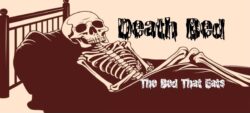
- 28
- 02
- 2025

- 07.30
- pm
ADWAITH [SOLD OUT] w/ Olivesque
- £12.50
- Buy Tickets
Hailing from the Welsh town of Carmarthen, Adwaith grew up surrounded by a rich tradition of Welsh-language indie-rock, and a tight-knit scene of experimental, artistically-minded bands that frequented their beloved local venue The Parrot. Inspired by the lineage of boldly experimental bands that emerged out of Wales in the ‘80s – Datblygu, TraddodiadOfnus and Fflaps to name three groups spearheading new wave Welsh rock music at the time – Adwaith knew that they wanted to be similarly uncompromising in their own vision. When Hollie Singer, Gwenllian Anthony and Heledd Owen first went about founding their own band in 2015, they were also equally influenced by newer acts they’d seen playing at local indie venues and Welsh-Language music festivals, where they bore witness to another new wave of musicians wielding Welsh as an exciting musical instrument.
After signing to Carmarthen-based indie label Libertino, Adwaith released their debut single ‘Pwysau’ in 2016, and steadily built on these promising foundations as they delved into mangled, free-wheeling post-punk recalling just some of their heroes: CAN, The Breeders, and NEU! That same year, debut album ‘Melyn’ perfectly skewered the anxiety and unease of becoming an adult in a fraught political climate, in a region too often sidelined and ignored by Westminster. The record went on to win the prestigious Welsh Music Prize, and the likes of BBC Radio 1, BBC 6 Music, KEXP, NPR and BBC Introducing’s Huw Stephens all threw their support behind the group along the way.
In 2022, meanwhile, the band released their widescreen follow-up ‘Bato Mato’ – inspired by illuminating train journey into the remote rural reaches of Siberia aboard the Trans-Siberian Express to play UU. Sound festival in Ulan-Ude. In a historic first, the band became the first act ever to win the Welsh Music Prize twice over, and now have three headline tours, two acclaimed Glastonbury sets and Manic Street Preachers and IDLES support slots under their belts.
Adwaith might be a band with clear roots set down in Wales – but looking towards the future, they’re now keenly focused on taking the language worldwide.



